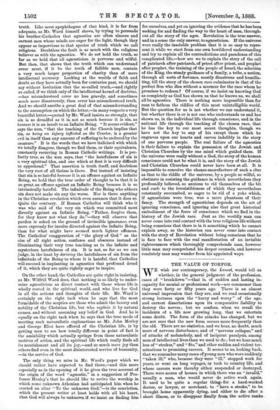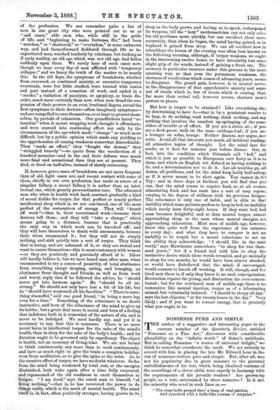Tical VALUE OF TORPOR.
WE wish our contemporary, the Lancet, would tell us whether, in the general judgment of the profession, cases of " breakdown "—that is, of sudden and lasting in- capacity for mental or professional work—are commoner than they were forty or fifty years ago. There is an almost universal impression that they are, and we read occasionally strong lectures upon the "hurry and worry" of the age, and earnest dissertations upon its comparative liability to destroy the nerves ; but we confess, when we recall the incidents of a life now growing long, that we entertain some doubt. The form of the attacks has changed, but we are not sure that the new form occurs more frequently than the old. There are no statistics, and we hear, no doubt, much more of nervous disturbance, and of "nervous collapse," and of attacks of melancholy, and of incipient paralysis, among men of intellectual lives than we used to do ; but we hear much less of " strokes," and " fits," and other sudden and violent ter- minations to promising careers. It seems to us, looking back, that we remember many cases of young men who were suddenly "taken ill," who, because they were "ill," stopped work for years, or went on long voyages, or took to country life, and whose careers were thereby either suspended or destroyed. There were scores of houses in which there was an " invalid," usually a man, who would never do active work again. It used to be quite a regular thing- for a hard-worked doctor, or lawyer, or merchant, to " have a stroke," to be brought home apparently dying, and either to die after a short illness, or to disappear finally from the active ranks
of .the profession. We can remember quite a list of men in one great city who were pointed out to us as "saki cases," able men who, while still in the pride of life, and "beginning to make fortunes, Sir," had been " stricken," or " shattered," or " overtaken," in some unknown • way, and had thenceforward doddered through life as in- capacitated men, watched tenderly by relations, but, looking as if early senility, an old age which was not old age, had fallen suddenly upon them. We rarely hear of such cases now, though we hear every day of men afflicted with "temporary collapse ;" and we fancy the truth of the matter to be nearly this. In the old days, the symptoms of breakdown, whether from overwork, or continued anxiety, or excessive temporary overstrain, were but little studied, were treated with tonics and port instead of a cessation of work, and ended in a " stroke," a visitation of paralysis, or apoplexy, or brain dis- order, much more certainly than now, when men dread the sus- pension of their powers to an even irrational degree, reveal the first symptoms to their doctors—often imaginary symptoms— and are compelled to cure themselves, or at least to protect them- selves, by periods of relaxation. Our grandfathers hated "re- laxation" when it meant stopping work, thought it effeminate, and were coerced into continuing effort not only by the circumstances of the age which made " change " so much more difficult, but by a public opinion which made any yielding to the apprehension of coming weakness somewhat discreditable. They "made an effort," they "'fought the demon," they " struggled bravely "—we quote from the recollection of a hundred memoirs—and in the end their defeats were much more final and sensational than they are at present. They died, or lived on half-alive, instead of slowly recovering.
If, however, grave cases of breakdown are not more frequent than of old, light cases are; and recent contact with some of them, chiefly in our own profession, has made us aware of a singular fallacy, a moral fallacy it is rather than an intel- lectual one, which greatly procrastinates cure. The educated men who when in health work hard, contract gradually a kind of moral dislike for torpor, for that perfect or nearly perfect intellectual sleep which is, we are convinced, one of the most perfect of the restoratives of energy. They will "knock off work "—that is, their accustomed work—because their doctors tell them; and they will "take a change," which means going to a distance, because that is practically the only way in which work can be knocked off; and they will bore themselves to death with amusements, because their wives recommend it ; but they will not do simply nothing, and sink quietly into a sort of torpor. They think that is lazing, and are ashamed of it, or they are stoical and -want to coerce themselves—this is most customary with women —or they are positively and genuinely afraid of it. Idlers will hardly believe it, but we have heard man after man, when recommended to try a course of passivity, of total abstinence from everything except sleeping, eating, and lounging, an abstinence from-thought and friends, as well as from work and worry, reply that if he followed the advice, he "should never get into harness again." He "should be all un- strung." He should not only have lost a bit of his life, but he " should have weakened all his faculties." " There is some- thing shameful," said one good friend, " in being a mere log, even for a time." Something of the reluctance is no doubt instinctive, and born of the reluctance of the mind to give up its habits ; but a great deal more is moral, and born of a feeling that indolence bath in it somewhat of the nature of sin, and is never to be indulged. We need hardly say, and yet it is necessary to say, that this is nonsense. There is no more moral harm in intellectual torpor for the sake of the mind's health, than in sleep for the sake of the body's health; and its duration ought to be governed only by expediency. The object is health, not an economy of living-time. We are not bound to think continuously, any more than to work continuously, and have as much right to give the brain a complete holiday, even from meditation, as to give the spine or the wrist. As to the curative effect of torpor, we have no doubt whatever. So far from the mind being weakened by total rest, or the energies diminished, both wake again after a time fully recovered, and repossessed of the old readiness to exert themselves to fatigue. " I am tired," says the cured man to himself, " of doing nothing,"—that is, he has recovered the power to do things easily, which is the mark of mental health. The mind itself is, in fact, often positively stronger, having grown in its
sleep as the body grows, and having, so to speak, resharpened its weapons, till the " lazy" mathematician can not only solve his old problems more quickly, but can recollect them more accurately, than when he began, the mind having gained, as in boyhood it gained from sleep. We can all recollect how in schooldays the lesson of the evening was often best known on the following morning, although, if torpor weakens, we ought in the intervenin' g twelve hours to have invariably lost some slight grip of the words, instead of gaining a fresh one. The memory in particular recovers under this process in the most amazing way, so that even the permanent weakness, the slowness of recollection which comes of advancing years, seems to disappear. The grand gain, however, is in mental nerve, in the disappearance of that apprehensive anxiety and sense not of strain which is, but of strain which is coming, that, far more than actual toil, however severe, shatters men's powers to pieces.
But how is torpor to be attained? Like everything else, by determining to have it,—that is, by a persistent resolve to be lazy, to do nothing, read nothing, think nothing, and say nothing that involves the smallest up-springing of the sense either of trouble or of effort. If you are a sitter, sit ; if you are a deck-pacer, walk on the same cabbage-leaf ; if you are a lounger on sofas, lounge. Neither discuss, nor argue, nor write. Avoid all that interests you much, all habitual reading, all attractive topics of thought. Let the mind laze for weeks, as it does for minutes just before dinner. Get, in fact, into the condition which Orientals call " kef," and which is just as possible to Europeans over forty as it is to them, and which an English wit defined as having nothing to do, and a determination not to do it. Let all troubles go, all duties, all problems, and let the mind keep lazily half-asleep, as if it •never meant to be alert again. You cannot do it ? Try ; and in three days at farthest you will find that you can, that the mind ceases to require food, or, at all events, stimulating food, and has sunk into a sort of easy repose, varying in the degree of stillness with its previous fatigue. The reluctance is only one of habit, and is akin to that inability which some patients profess to keep in bed, an inability which rarely lasts forty-eight hours. If they want bed, bed soon becomes delightful, and so does mental torpor, almost approaching sleep, to the man whose mental energies are approaching exhaustion. Most men of middle age, however, know this quite well from the experience of ten minutes in every day ; and what they have to conquer is not an inability to be torpid, but a moral reluctance to act on the ability they acknowledge. "I should like in the next world," says Hawthorne somewhere, "to sleep for two thou- sand years;" but if a friend had told him to obey the instinctive desire which those words revealed, and go mentally to sleep for two months, he would have been almost shocked, or would have disbelieved that the mind, if encouraged, would consent to knock off working. It will, though, and for tired men there is, if only they know it, no such reinvigoration. Recreation repairs the young, and distraction the over-concen- trated ; but for the overtaxed man of middle-age there is no restorative like mental inaction, torpor as of a hibernating animal, but voluntarily induced. " I should be sleepy all day," says the last objector, " or for twenty hours in the day." Very likely ; and if you want to restore energy, that is precisely what you ought to be.



















































 Previous page
Previous page